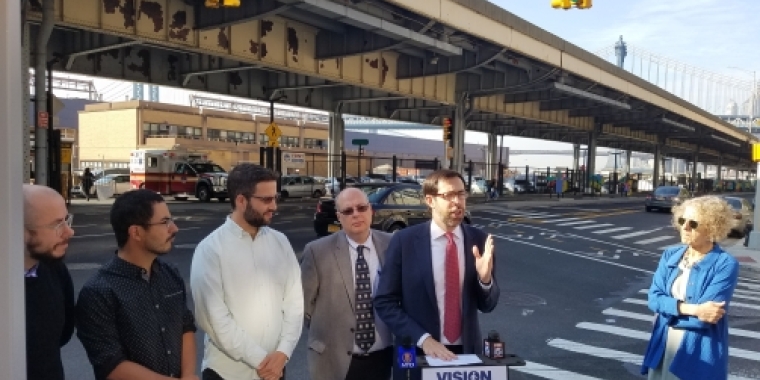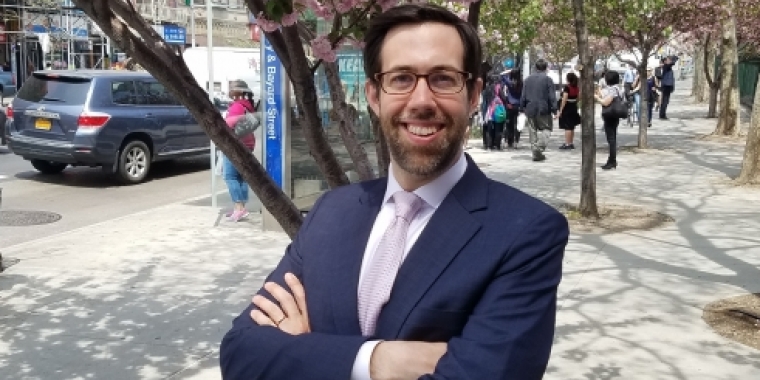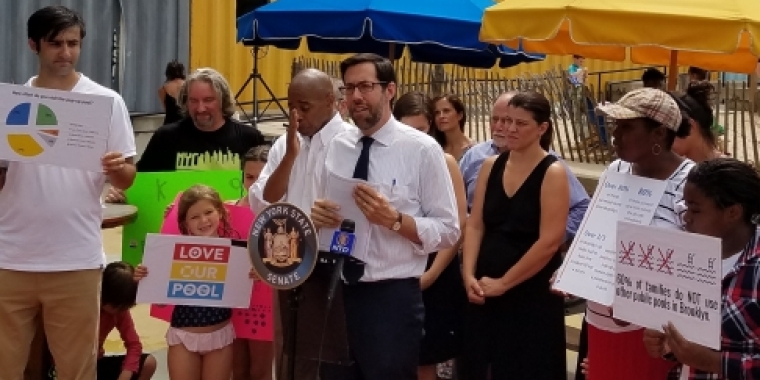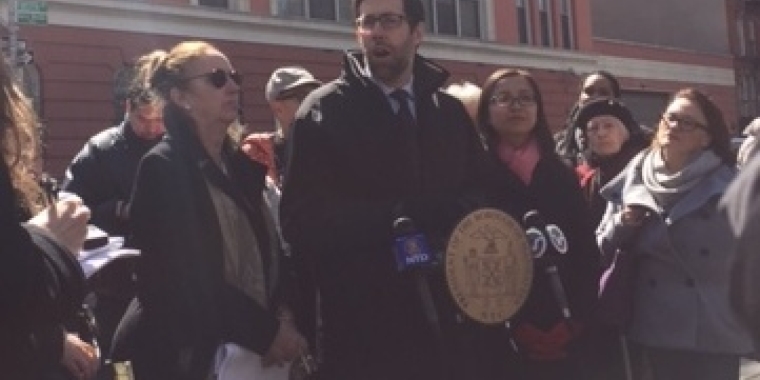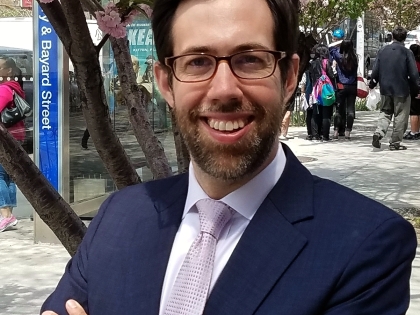
Senator Squadron Joins Assembly Speaker Silver, Council Member Chin and DOT Commissioner Janette Sadik-Khan to Announce Agreement with City on Permit System for Intercity Buses
April 23, 2012
State legislation would allow city to regulate intercity buses and designate stops, creating much-needed oversight ability
First-ever permit system will bring order to Chinatown and citywide
Assembly Speaker Sheldon Silver, State Senator Daniel Squadron, Council Member Margaret Chin and Department of Transportation Commissioner Janette Sadik-Khan today announced an agreement with the city on state legislation to create the first-ever permit system for intercity buses, giving the city the power to regulate the industry and designate pick-up and drop-off locations.
Intercity buses have caused serious problems on the streets of Chinatown in Manhattan and elsewhere by idling, causing congestion and pollution, and interfering with pedestrians and businesses.
These low-cost intercity buses have also been involved in a number of serious accidents in recent years, some of them fatal. The agreement on the bill is part of a federal, state and local effort to bring stricter oversight to the industry, which has expanded rapidly over the past 15 years. The permit system would provide the city and the public with key information about bus companies, creating additional much-needed oversight.
The Silver-Squadron legislation would authorize the city to establish a permit system and designate pick-up and drop-off locations. The legislation requires the city to consult with local community boards and allow for a 45-day comment period, prior to issuing permits for pick-up and drop-off locations. The city would also be able to require bus companies to provide information about the buses they are using, the number of passengers they are carrying and where they would be parked when not in use. Violators would face fines of up to $2,500 and the loss of their permit.
“City permits for intercity buses are a big step toward protecting communities and passengers alike. As the low-cost bus industry continues to grow, this legislation will help end Chinatown's wild west atmosphere while allowing the city to identify problems before they become tragedies,” said Senator Squadron. “By creating the first-ever bus permit system we will allow the city to work with communities to designate pick-up and drop-off stops. And by providing the city and the public with critical information about bus companies, we will add much-needed oversight to the industry. I was pleased to work with Speaker Silver to bring together the parties to reach agreement on this new and complex issue; thank you to the city, Councilmember Chin and all of our colleagues in government. I look forward to getting this passed in Albany and continuing to work with our partners on the federal and local levels to improve safety and quality of life.”
“This legislation will bring order to the chaos of intercity buses on our streets, particularly in my Chinatown community,” Speaker Silver said. “By giving the city the ability to regulate this industry, we are helping to improve the quality of life for Chinatown residents by cutting down on traffic congestion and pollution, while making our sidewalks and streets safer. We are also improving conditions for the passengers by giving the city the ability to create a permit system for bus operators.”
“This bill will go a long way towards restoring order on our streets and sidewalks,” said Council Member Chin. “Currently, intercity tour buses can park wherever and whenever they want. Our neighborhoods – especially Chinatown and Tribeca – are overwhelmed by the volume of buses on local streets. These tour buses idle in front of residential buildings and bring noise, trash, and pollution with them. Passengers queue on the sidewalk and parked buses create a hazard for drivers and pedestrians. Making the city responsible for regulating the intercity bus industry is the right thing to do for our community and for passengers alike.”
“Intercity bus transportation isn't a one-way street and maintaining a reliable network shouldn't turn our neighborhood streets into de facto bus depots,” said DOT Commissioner Sadik-Khan. "This legislation will help eliminate this legal blind spot and bring order to the free-for-all on our neighborhood streets and sidewalks.”
“Community Board 3 has been advocating for the permitting of intercity buses for many years,” said Dominic Pisciotta Berg, Chair of Community Board 3. “This agreement is great news for our community and will allow our leaders in Albany to move forward with legislation that will regulate and control buses in a safe manner with less negative impact on our residents and businesses. Community Board 3 is extremely appreciative of Assembly Speaker Silver, Senator Squadron, Council Member Chin, and Commissioner Sadik Khan’s successful efforts to make this happen. It is a reflection of their responsiveness, hard work, and concern for our community."
“Safety first. This legislation will insure that intercity buses are regulated. We thank our Speaker Sheldon Silver, Senator Daniel Squadron and Councilmember Margaret Chin for their leadership and their concern for public safety,” said Chinatown community leader Virginia Kee. “It is also significant that the sate and the city can work together to improve the live of all New Yorkers.”
“The CCBA and the Chinese American communities in New York are very happy for this first-ever permit system,” said Paul K. Ng, President of the Chinese Consolidated Benevolent Association. “We are confident that this new system will protect the safety of the passengers of intercity buses as well as the pedestrians in our communities.”
“This legislation is an important step. We now have a solution that will help both the community and the bus companies at the same time,” said Justin Yu, Chair of the Chinese Chamber of Commerce.
“Given the popularity in intercity bus ridership and how vital these lifelines are to New York's Chinatown, we are delighted that the public will now have a more predictable and safer way to using this important mode of public transport,” said Wellington Chen, Executive Director of the Chinatown Partnership. “We commend everyone involved for taking this proactive action to help Chinatown maintains its relevancy and vitality.”
“I commend Speaker Silver, Senator Squadron, and Council Member Chin’s intercity bus permitting agreement in bringing together community leaders, residents and local businesses to establish legal permitting guidelines to protect the safety of our neighborhoods,” said Christopher Kui, the Executive Director of Asian Americans for Equality.
The agreement on the bill is part of a federal, state and local effort to bring stricter oversight to the low-cost, intercity bus industry, which has expanded rapidly over the past 15 years.
The legislation would:
- Require that bus permit applications include identification of the intercity bus company, identification of the specific buses to be used, identification of the bus stop location(s) being requested, the total number of buses and passengers expected to use each location, bus schedules, and identification of the places where buses would park when not in use
- Require the city, prior to assigning an intercity bus stop, to consult with local community boards and the MTA (if an intercity bus stop would overlap with an MTA bus stop), and to consider traffic, safety, and applicant preferences
- Require that applicants, the local community board and the MTA (if applicable) receive notification prior to an intercity bus stop being relocate
- Require the city, prior to issuing a permit or permanently amending a permit, to consult with the local community board, including a 45 day notice and comment period
- Authorize intercity bus stops to be temporarily changed for up to 90 days, with written notice to the local community board
- Establish that permits would be for terms of up to three years, authorize permit fees (up to $275 per vehicle annually), and require intercity buses to display permits
- Provide for public involvement through the city’s rulemaking process (including public hearings), and through on-line posting of approved applications and all intercity bus stops
- Provide for penalties for intercity buses that load or unload passengers on city streets either without a permit or in violation of permit requirements or restrictions (a fine of up to $1,000 for a first violation, up to $2,500 for repeat violations, and suspending or revoking a permit).
###
